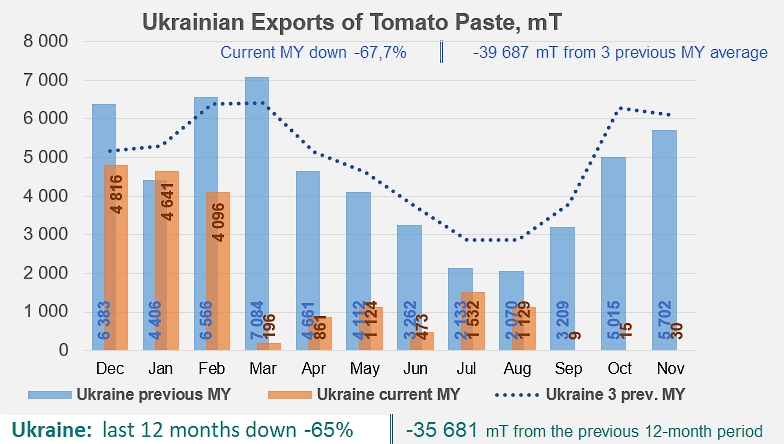With Sweden’s exceptional support, EBRD helps tomato paste producer survive and protect its staff.
The story of Agrofusion, a family-owned Ukrainian business that grows and processes tomatoes, is one of resilience and determination in the face of adversity.
The company started small in 2005 but grew steadily over the years to become Ukraine's leading producer of tomato paste, with exports to Europe, Asia and Africa. It was also the third largest producer of tomatoes in Europe, with clients such as Nestle, Heinz, PepsiCo, Unilever, Orkla, Develey, and Coca-Cola.
Already a longstanding European Bank for Reconstruction and Development (EBRD) client, Agrofusion had been thriving over the past years, with plans for expansion and implementation of high-tech farming solutions to ensure the best green agribusiness solutions were met.
But like for so many other businesses, the full-scale war on Ukraine put Agrofusion on the brink of survival. By March 2022, its farms and factories in the Kherson region and in the east of the Mykolaiv region had come under enemy occupation, leaving only its farms and factory in the north of the Mykolaiv region able to continue seeding, nursing and growing tomatoes in its vast greenhouses, before processing them into paste.
However, even in the north of Mykolaiv region, things were not “business as usual”. Many of Agrofusion’s employees there had lost their homes to shelling and decided to leave the area to find shelter and safety. It was not long before the company started facing a severe labour shortage.
“Without people to work in our greenhouses and factory, and the timely financial support from the EBRD, Agrofusion would be unable to grow, harvest and process its tomatoes. This would have an impact not just on our revenues but on Ukraine’s food security as well,” explains Olexiy Sypko, one of Agrofusion’s shareholders.
An unusual request
To encourage its homeless workers to stay in the south of Ukraine or return home, Agrofusion decided to invest in 18 mobile homes to accommodate 30 people who could work in its greenhouses and factories and have somewhere safe and comfortable to live while continuing to support their families. But given the circumstances, resources were scarce and financing not easily available, so the company turned to the EBRD for help.
Thanks to outstanding coordination efforts from the EBRD and a generous donor contribution from the Swedish International Development Cooperation Agency (SIDA), the purchase of mobile homes was made possible. As a result, Agrofusion managed to keep supporting its employees, and its business.
“Our main business goal today is to re-establish cultivation of tomatoes and production of paste as soon as possible, and we hope for the recovery of sales markets, jobs, and tax payments to pre-war levels. Our short-term plans are to make sure that the company has sufficient working capital and funds for the restoration of equipment that was destroyed by Russia’s completely unprovoked war,” explains Olexiy.
This is a story of collaboration and concerted action driven by a shared goal: to tackle daunting challenges through the combined efforts of individuals and organisations.
"We are inspired by people who stayed in Mykolaiv, our employees, our families, and our children. Our family members are helping as volunteers by producing candles to be used in trenches. Agrofusion is also providing assistance by continuing to pay salaries to employees who were drafted to the army,’’ Olexiy adds.
“We sincerely thank the EBRD team and the Swedish government for their help in buying modular housing for Agrofusion’s employees who, despite losing their housing and workplace, kept the desire to continue producing tomato paste and bring the standards of sustainable agriculture to new regions.”
Note: published with the permission of Oleksiy Sypko
Source: ebrd.com
Some complementary data
As shown by the graph below, Ukrainian exports of tomato paste have been reduced to zero by the Russian invasion. Our monthly global trade monitoring shows that the quantities mobilized between March and November 2022 did not exceed a few hundred tonnes, while Ukraine has exported between 55,000 and 59,000 tonnes of tomato paste annually over the past three years.































